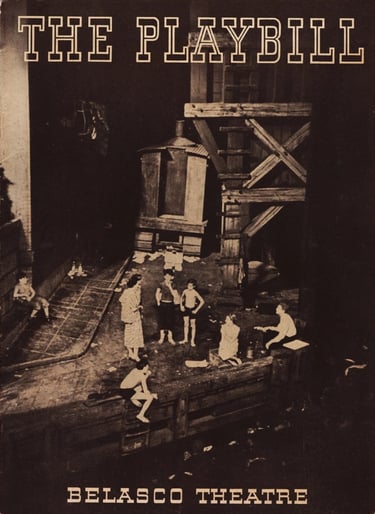In 1934, Sidney Kingsley wrote a play about a group of children growing up on the streets of New York City. Fourteen children were hired to play various roles in the play, including Billy Halop (Tommy), Bobby Jordan (Angel), Huntz Hall (Dippy), Bernard Punsly (Milty), Gabriel Dell (T.B.), and Leo Gorcey.
The play opened at the Belasco Theatre on October 28, 1935, and ran for two years, totaling 684 performances. Samuel Goldwyn and director William Wyler saw the play and decided to turn it into a film. They paid $165,000 for the rights to the film and began auditioning actors in Los Angeles. Failing to find actors who could convey the emotions they saw in the play, Goldwyn and Wyler had six of the original Kids (Halop, Jordan, Hall, Punsly, Dell, and Leo Gorcey) brought from New York City to Hollywood for the film. The Kids were all signed to two-year contracts, allowing for possible future films, and began working on the 1937 United Artists' film, Dead End. The actual name of the gang of boys in Dead End is written in chalk on the wall shown throughou the movie. It reads: "East 53rd Place Gang Members Only". During production, the boys ran wild around the studio, destroying property, including a truck that they crashed into a sound stage. Goldwyn chose not to use them again and sold their contract to Warner Bros.
Warner Bros. had initially attempted to rename them the "Crime School Kids" through advertisements for their first two films produced there, starting with Crime School (1937), to disassociate them from their previous studio's film, and promote their own. In 1938, they made their only color appearance in a short film, Swingtime in the Movies, and were referred to as that name. This was all in vain, though, as the name never caught on, and they remained the Dead End Kids
At Warner Bros., the Dead End Kids made six films with some of the top actors in Hollywood, including James Cagney, Humphrey Bogart, John Garfield, Pat O'Brien, and Ronald Reagan. The last one was in 1939, when they were released from their contracts owing to more antics on the studio lot.

